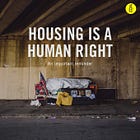
Housing and community development are inherently local issues. We’re talking about our towns, cities, neighborhoods and homes. Things happening in our literal backyards! So much of housing policy is decided locally— from zoning to planning board approvals and building permits — with much of the rest decided by states. But federal government has a major role to play.
At the national level, housing is mostly under the jurisdiction of the Department of Housing and Urban Development (HUD), but you’ll also find housing policy and programs administered by the Department of Agriculture, Department of Veterans Affairs, Department of the Interior and even FEMA.
The most obvious impact that Congress and the President have is on the budget. Billions of dollars through the agencies above into states and municipalities, helping to build and renovate and preserve housing, underwriting and financing home loans, and providing rental assistance to tenants.
Choices about how and whether to ensure access to quality, affordable housing are made at every level. Even as most of the concrete decisions — like whether to approve a construction project or whether to allow multifamily units in a neighborhood — are made in your city or town, so much of the funding that enables any housing at all to be built or sold or rented come from upstream.
So yes, presidential elections matter for housing.
A president can commit to fully funding HUD’s programs, to actually providing money for local public housing authorities to renovate and upgrade their buildings so that they don’t become privatized. A president can recognize and prioritize addressing our nation’s legacy of federal housing discrimination and commit to enforcing fair housing laws throughout the country.
A president can push for funds to prevent foreclosures during a global pandemic and economic downturn. A president can sign recovery acts into law, like the American Rescue Plan Act, that gave communities the resources they needed to rebound from COVID-19, with a priority on housing affordability and neighborhood stabilization. A president can sign into law the Inflation Reduction Act which, among many other things, helps families make their homes more energy efficient. A president can champion legislation to cap rent increases across the nation.
A president can craft and advocate and negotiate for the passage of a Green New Deal that includes the construction of new, sustainable housing units (good paying jobs + housing supply) along with the decarbonization and modernization of public housing.
Or a president can disparage cities, pledge to block affordable housing from the suburbs, promote segregation and roll back fair housing protections. Without an understanding of housing policy and practice, a president can push for so-called reforms like Opportunity Zones that largely funneled tax breaks to wealthy investors instead of making any meaningful impact on the housing deficit. A president’s administration can take the housing crisis seriously, or it can blame immigrants and refugees as though they are to blame.
I prefer to focus on the local solutions to our challenges, and I’ll keep doing that. But for so many issues important to us — housing, climate, health care, human rights — we need the federal government to lead. We need national leaders who believe that housing is a human right and are willing to use their political capital and influence to enact policies and programs that prove it.
Also:
Five housing issues motivating young voters.
A fascinating pitch for a national urbanist political party. Sign me up!
Our letter-writing happy hour last night was a success! Together we wrote 200 letters to our neighbors slightly to the south in NY-18, encouraging them to get out and vote this election season. It was also pretzel night at Nine Pin and thus an all-around good time.
We have a very cute Neighborhood Bingo challenge happening now at Habitat, play along with us!






